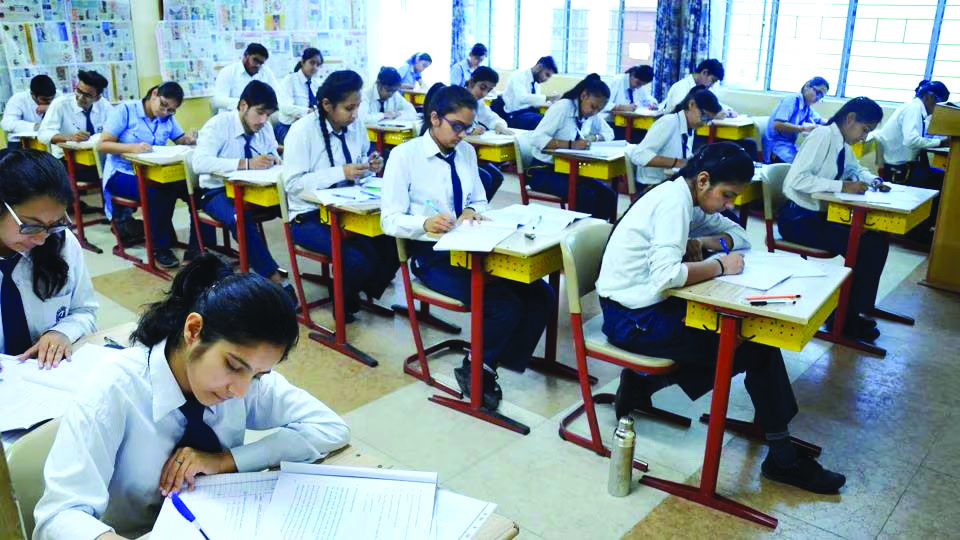Autar Nehru (Delhi)

CBSE school-leavers writing final exam: grades inflation hurdle next
With the two national school examination boards — the Central Board of Secondary Education (CBSE, 28,926 affiliated schools) and Council for the Indian School Certificate Examinations (CISCE, 2,700 schools) — and 69 state boards scheduled to stage their school-leaving examinations within the next four months, exam fever has broken out across the country.
The peaceful co-existence of such a large number of school-leaving exam boards prescribing differing syllabuses and curriculums and practising liberal and rigorous marking of exam papers has always posed a problem for the admission departments of the country’s 42,000 junior (classes XI-XII) and undergrad colleges countrywide.
For several decades under a Central government directive Central government and aided colleges are obliged to give equivalence to marks/grades attained by students in class XII exams countrywide. Yet it’s an open secret that some state boards mark answer papers very liberally. This has prompted even national boards — CBSE and CISCE — to do likewise. Hence grades inflation has become a national practice with schools (and test-prep firms) trumpeting the 95 percent-plus average scores of their students.
In turn, this has prompted the country’s top-ranked colleges to notify impossibly high — sometimes 100 percent — admission cut-offs. To get around the problem of school board exams equivalence, in 2022, the University Grants Commission introduced CUET (Common University Entrance Test) to determine admission into colleges affiliated with 56 Central government universities. Since then, several state government and private universities have also started admitting school-leavers on the basis of CUET scores.
However, the hurried introduction of CUET in 2022 has endangered the country’s secondary education system and the class XII examinations of national and state boards, in particular.
Sudha Acharya, former chairperson of the Delhi-based National Progressive Schools’ Conference (NPSC) which has a membership of 400 private CBSE schools, is opposed to CUET for not according any weightage to the class XII board exam scores. “CUET has severely devalued the high school education system. With CUET scores being the be all and end all for college admissions, higher secondary students may well abandon schools and flock to coaching centres to prep for CUET,” says Acharya, also principal of the CBSE-affiliated ITL Public School, Dwarka, Delhi.
Therefore, on the recommendation of the Dr. K. Kasturirangan Committee’s report, the National Education Policy (NEP) 2020 has mandated the PARAKH (Performance, Assessment, Review & Analysis of Knowledge for Holistic Development) programme to set and regulate common syllabuses and curriculums for all 69 examination boards to ensure equivalence of children’s learning outcomes countrywide. According to NCERT sources, finalisation of the PARAKH template is nearing completion and parity or near-equivalence between all exam boards will become a reality by 2026.
Simultaneously, the two national boards — CBSE and CISCE whose affiliated higher secondary schools could be reduced to irrelevance by India’s Rs.20,000 crore test-prep aka coaching industry — are in the process of ringing in syllabus/curriculum and assessment reforms to take on the test-prep industry by switching from rewarding rote learning and memorisation skills to developing children’s comprehension, thinking and knowledge application skills which will henceforth be rewarded by exam boards.
“It’s a misconception that the introduction of CUET has rendered school leaving exams irrelevant. CBSE has already notified that henceforth it will be assessing the critical thinking, problem solving and knowledge application skills of students writing the class X and XII board exams. This will not only prepare school children for CUET but also international tests such as PISA. Very soon schools will be able to compete with test prep centres,” says Naman Jain, director, Silverline Prestige School, Ghaziabad.
If PARAKH succeeds is standardising the syllabuses and curriculums of the country’s 69 examination boards and ensures near equivalence, it will undoubtedly give a huge quality boost to K-12 education countrywide. The country’s massive Rs.20,000 crore test-prep aka coaching industry owes its prosperity to obsolete syllabuses/curriculums prescribed by state exam boards, poor teaching-learning standards in the great majority of the country’s 1.4 million schools which continue to test rote learning and memorisation skills of children. On the other hand, admission departments of undergrad colleges are increasingly demanding critical thinking, problem-solving and innovation skills.
If the PARAKH initiative enables standardisation of secondary education syllabuses, curriculums and pedagogies, it could translate into the beginning of the end of the iniquitous test-prep industry which favours children from rich households to disadvantage of the poor.





















